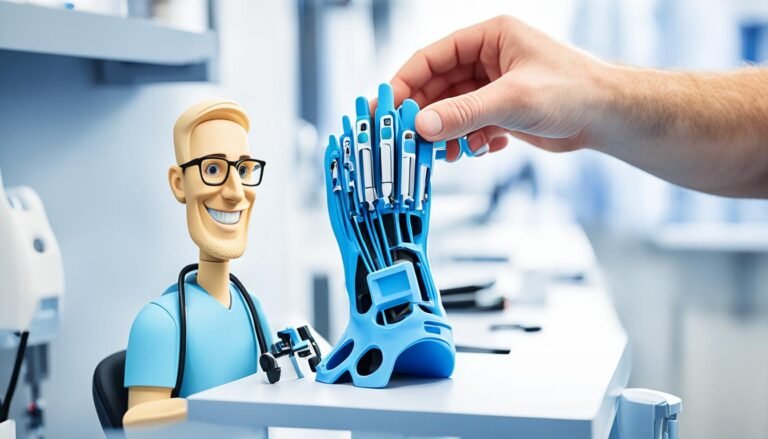Machine Learning Algorithms for Predicting Patient Outcomes
Did you know that healthcare data analytics and AI technology can accurately predict patient outcomes through machine learning algorithms? This groundbreaking approach has the potential to revolutionize healthcare as we know it, providing valuable insights into prognosis and treatment outcomes. In this article, we will explore the role of machine learning algorithms in predicting patient outcomes and the impact they have on healthcare.
Key Takeaways:
- Machine learning algorithms utilize healthcare data analytics and AI technology to predict patient outcomes.
- These algorithms analyze patient data and identify patterns and trends that contribute to accurate prognostication.
- Predictive analytics in healthcare enables data-driven decision-making and optimization of patient care.
- Implementing machine learning algorithms in healthcare settings requires overcoming challenges such as data integration and algorithm validation.
- Machine learning can significantly impact patient outcomes by enhancing decision-making, improving accuracy in diagnosis and treatment planning, and optimizing resource allocation.
The Importance of Predictive Analytics in Healthcare
Predictive analytics plays a crucial role in healthcare by utilizing machine learning algorithms to analyze large amounts of patient data and identify patterns and trends that can help predict patient outcomes. Data-driven healthcare solutions enable healthcare providers to make informed decisions and optimize patient care based on accurate predictions and prognostics.
By harnessing the power of predictive analytics in medicine, healthcare professionals can leverage the vast amount of data generated in healthcare settings to gain insights into patient health and make proactive, data-driven decisions. These data-driven healthcare solutions revolutionize the way patient care is delivered, providing precise and personalized interventions.
Predictive analytics in healthcare not only enables accurate prediction of patient outcomes but also plays a vital role in identifying high-risk populations. By analyzing historical patient data and identifying risk factors, healthcare providers can proactively intervene to prevent adverse events such as hospital readmissions. This can help reduce healthcare costs and improve patient outcomes.
The integration of predictive analytics in healthcare also empowers healthcare providers to optimize resource allocation. By anticipating patient needs and predicting resource utilization, healthcare facilities can ensure proper staffing, allocate equipment effectively, and streamline workflows. This not only enhances patient care but also improves operational efficiency.
“Predictive analytics in medicine allows us to move away from a reactive and ‘one-size-fits-all’ approach to a proactive and personalized model of care.”
The benefits of data-driven healthcare solutions powered by predictive analytics extend beyond individual patient care. As healthcare systems strive to improve population health, predictive analytics can identify trends and patterns at a larger scale. This can help identify public health concerns, analyze the effectiveness of interventions, and develop targeted strategies for disease prevention and management.
The potential impact of predictive analytics in healthcare is vast and continues to evolve. As technology advances and more data becomes available, the accuracy and effectiveness of predictive models will only improve. This has the potential to revolutionize the healthcare industry, driving better patient outcomes, reducing costs, and improving healthcare delivery as a whole.
Benefits of Predictive Analytics in Healthcare
| Improved Patient Care | Enhanced Operational Efficiency | Optimized Resource Allocation |
|---|---|---|
| Personalized interventions based on accurate predictions | Informed decision-making for effective workflows | Better staffing and equipment allocation |
| Reduction in adverse events and hospital readmissions | Streamlined processes and reduced inefficiencies | Improved cost-effectiveness |
| Promotion of population health | Identification of public health concerns | Targeted strategies for disease prevention |
Machine Learning Algorithms for Patient Diagnosis
Machine learning algorithms have revolutionized patient diagnosis in healthcare. By leveraging advanced technologies such as artificial intelligence, these algorithms analyze various types of patient data to accurately diagnose a range of conditions and predict patient outcomes. From medical images to laboratory results and clinical information, machine learning algorithms utilize data-driven insights to enable accurate and timely diagnoses.
Artificial intelligence plays a pivotal role in enhancing the accuracy and efficiency of these algorithms. By automating the diagnostic process, AI reduces human error and ensures consistent and reliable results. This technology enables healthcare professionals to make informed decisions based on reliable predictions, leading to improved patient outcomes.
“Machine learning algorithms have transformed patient diagnosis by providing accurate and efficient diagnostic tools powered by artificial intelligence.”
These algorithms analyze vast amounts of patient data, which may include medical imaging data such as X-rays, MRIs, CT scans, and pathology slides. By extracting patterns and features from this data, machine learning algorithms can effectively distinguish between normal and abnormal conditions, aiding in the accurate diagnosis of various diseases.
Moreover, machine learning algorithms can predict patient outcomes based on historical data and clinical information. By considering multiple factors such as demographics, medical history, and symptomatology, these algorithms can provide valuable prognostic insights. This predictive capability allows healthcare professionals to optimize treatment plans and interventions, ultimately leading to improved patient outcomes.
“Machine learning algorithms provide valuable prognostic insights, enabling healthcare professionals to optimize treatment plans and interventions for improved patient outcomes.”
The integration of machine learning algorithms into healthcare systems has the potential to significantly improve diagnostic accuracy, reduce healthcare costs, and enhance patient care. However, it is important to address challenges such as data quality, algorithm bias, and ethical considerations related to patient privacy.
With ongoing advancements in machine learning research and the increasing adoption of artificial intelligence in healthcare, the future of patient diagnosis holds great promise. Continued innovation in this field will further enhance the effectiveness and efficiency of machine learning algorithms, enabling healthcare professionals to deliver personalized, precise, and timely diagnoses for improved patient outcomes.
Real-world Applications of Machine Learning in Patient Diagnosis
To illustrate the impact of machine learning algorithms in patient diagnosis, let’s explore a few notable real-world applications:
| Application | Description |
|---|---|
| Radiology Image Analysis | Machine learning algorithms can analyze medical images and detect abnormalities or specific conditions, such as tumors or fractures, with high accuracy. |
| Pathology Diagnostics | Machine learning algorithms can analyze pathology slides and aid pathologists in diagnosing diseases, such as cancer, by identifying cellular patterns and anomalies. |
| Genetic Sequencing | Machine learning algorithms can analyze genetic sequences to identify genetic variations and mutations associated with specific diseases or conditions. |
| Clinical Decision Support Systems | Machine learning algorithms can assist healthcare providers in making evidence-based decisions by analyzing patient data and recommending appropriate diagnostic tests or treatment options. |
These examples highlight how machine learning algorithms have transformed patient diagnosis, enabling accurate and timely detection of diseases and conditions. With ongoing research and advancements in this field, the role of machine learning in healthcare is only expected to grow, further revolutionizing patient care and outcomes.
Predicting Patient Mortality Using Machine Learning
Machine learning algorithms play a crucial role in predicting patient mortality, aiding healthcare providers in identifying high-risk patients and intervening early to improve patient outcomes. By analyzing a diverse range of patient data, including demographic information, medical history, and clinical indicators, these algorithms can accurately predict the risk of death for individual patients.
The use of healthcare predictive modeling and AI in healthcare enables healthcare providers to leverage this valuable predictive power, allowing for proactive measures and targeted interventions. Through the analysis of patient data, machine learning algorithms can identify patterns and risk factors that contribute to patient mortality, providing healthcare professionals with vital information to guide their decision-making processes.
Machine learning algorithms can sift through vast amounts of patient data and identify key variables that contribute to mortality risk. These algorithms can detect subtle correlations and interactions that may otherwise be overlooked, providing healthcare providers with insights into patient prognosis.
By integrating machine learning algorithms into healthcare systems, healthcare providers can devise personalized care plans, allocate resources more efficiently, and optimize patient outcomes. Early identification of high-risk patients allows for timely interventions, such as tailored treatment plans, additional monitoring, or specialized care.
The integration of machine learning algorithms in healthcare carries the potential to save lives by identifying patients who are at a higher risk of mortality. By extending the capabilities of healthcare professionals, these algorithms streamline the decision-making process, allowing for more accurate and informed patient care.
The application of machine learning algorithms for predicting patient mortality is a significant step towards improving healthcare outcomes. By harnessing the power of AI in healthcare, healthcare providers can enhance their ability to identify high-risk patients, allocate resources effectively, and ultimately save lives.
Table: Key Factors Considered in Predicting Patient Mortality Using Machine Learning
| Factors | Contributions |
|---|---|
| Demographic Information | Age, gender, ethnicity |
| Medical History | Previous medical conditions, comorbidities |
| Clinical Indicators | Biometric measurements, vital signs, lab results |
| Treatment Plans | Medications, therapies, surgical interventions |
These factors, combined with advanced machine learning algorithms, allow healthcare providers to develop accurate models for predicting patient mortality. The integration of predictive analytics and AI in healthcare holds immense potential for improving patient outcomes and evolving the healthcare landscape for a healthier future.
Challenges and Limitations of Machine Learning Algorithms
While machine learning algorithms have shown great promise in predicting patient outcomes, there are several challenges and limitations that need to be addressed. Healthcare data analytics present various challenges concerning data quality, which can affect the accuracy and reliability of predictions. Incomplete or inaccurate data can lead to biased results and hinder the effectiveness of machine learning algorithms.
Another challenge is algorithm bias, where the predictions and decisions made by the algorithms reflect the biases and limitations of the data they were trained on. It is crucial to address and minimize algorithm bias to ensure fair and unbiased predictions for all patients, regardless of their demographic or medical history.
Interpretability is another limitation of machine learning algorithms in healthcare. While these algorithms can provide accurate predictions, the process behind their decision-making is often complex and difficult to interpret. Understanding how and why a particular prediction is made is important for building trust in these algorithms and ensuring that healthcare professionals can effectively utilize their outputs.
Generalizability is another significant challenge. Machine learning algorithms are often trained on specific datasets, and their performance may vary when applied to different populations or healthcare settings. Ensuring the generalizability of these algorithms is essential for their widespread use and application in healthcare.
Ethical considerations also come into play when using AI in healthcare. Patient privacy is a paramount concern when utilizing healthcare data for predictive analytics. Safeguarding patient information and ensuring data security are essential to protect patient privacy and maintain public trust in the healthcare system. Additionally, algorithmic transparency is crucial for understanding and auditing the decisions made by machine learning algorithms, ensuring accountability and mitigating potential biases.
“The potential of machine learning algorithms in healthcare is undeniable, but it is vital to address the challenges and limitations associated with their use. By focusing on improving data quality, reducing algorithm bias, enhancing interpretability, and ensuring generalizability, we can harness the power of AI in healthcare while upholding ethical standards and optimizing patient care.”
Efforts to overcome these challenges and limitations are ongoing, with researchers, policymakers, and healthcare professionals working together to develop robust and reliable machine learning algorithms. By addressing these issues head-on, we can fully realize the potential of AI in improving patient outcomes and transforming the healthcare industry.
Case Studies and Success Stories
Machine learning algorithms have proven to be powerful tools for predicting patient outcomes in healthcare. By utilizing artificial intelligence and analyzing large amounts of data, these algorithms have showcased tremendous success in various case studies. These success stories highlight the transformative impact of AI in patient outcomes prediction and the overall improvement of healthcare.
One notable success story involves the accurate diagnosis of rare diseases. Machine learning algorithms have demonstrated the ability to analyze medical images, genetic data, and patient records to identify rare conditions that might have otherwise been overlooked. By leveraging AI technology, healthcare providers can offer timely and effective treatments to patients, significantly improving their chances of recovery.
Another remarkable application of machine learning algorithms is the prediction of the risk of complications and readmissions in patients. By analyzing data such as patient demographics, medical history, and clinical indicators, these algorithms can accurately identify individuals who are more likely to experience complications or require readmission. This enables healthcare providers to intervene proactively, ensuring better patient outcomes and reducing healthcare costs.
The success of machine learning algorithms in predicting patient outcomes extends beyond individual cases. These algorithms have also been instrumental in optimizing healthcare resources. By analyzing large datasets and identifying patterns, algorithms can help healthcare providers allocate resources more efficiently. This ensures that patients receive the right level of care at the right time, resulting in improved overall healthcare delivery.
“Machine learning algorithms have revolutionized the way we predict patient outcomes in healthcare. By leveraging AI technology, we can make more accurate diagnoses, predict complications, and optimize healthcare resources. These success stories demonstrate the immense potential of machine learning in improving patient care and transforming our healthcare system.”
Overall, machine learning success stories in healthcare illustrate the immense possibilities of AI in patient outcomes prediction. These case studies validate the effectiveness of machine learning algorithms in diagnosing rare diseases, predicting complications, and optimizing healthcare resources. As healthcare continues to embrace AI technology, we can expect even more breakthroughs in patient care, ultimately leading to better outcomes and a more efficient and effective healthcare system.
Current Research and Future Directions
The field of machine learning research in healthcare is constantly evolving, with researchers focusing on overcoming the limitations and challenges of existing algorithms. The future of AI in patient outcomes prediction holds great promise for advancing personalized medicine, precision healthcare, and improving healthcare decision-making.
Researchers are exploring innovative approaches such as deep learning and ensemble models to enhance the accuracy and interpretability of machine learning algorithms in predicting patient outcomes. Deep learning techniques, inspired by the working of the human brain, enable algorithms to learn complex patterns and relationships in healthcare data, leading to more accurate predictions. Ensemble models combine the predictions of multiple algorithms to achieve higher performance and robustness.
“We believe that the integration of deep learning and ensemble models will significantly improve the accuracy and interpretability of patient outcomes prediction. These advanced techniques show great potential in transforming the way healthcare providers make decisions and provide personalized care.”
Enhancing Personalized Medicine
Machine learning research in healthcare aims to develop algorithms that can identify patient-specific factors influencing treatment outcomes. By integrating genetic, environmental, and lifestyle data with clinical information, machine learning algorithms have the potential to provide tailored treatment recommendations for individual patients. This approach can significantly enhance personalized medicine and improve patient outcomes.
Precision Healthcare and Risk Stratification
Precision healthcare involves accurately identifying patients at high risk for specific conditions or complications. Machine learning algorithms can analyze a wide range of patient data, including electronic health records, imaging data, and genetic information, to stratify patients based on their risk profiles. This enables healthcare providers to implement targeted interventions and preventive measures, reducing adverse events and improving patient outcomes.
Improving Healthcare Decision-Making
The future of AI in patient outcomes prediction holds the potential to revolutionize healthcare decision-making. Machine learning algorithms can analyze vast amounts of healthcare data, including clinical guidelines, medical literature, and real-world patient data, to provide evidence-based recommendations for diagnosis, treatment, and prognosis. These algorithms can aid healthcare providers in making well-informed decisions, leading to better patient outcomes.
As the field of machine learning research in healthcare continues to advance, it is crucial to address ethical considerations, ensure data privacy, and maintain algorithmic transparency. By doing so, we can harness the full potential of AI in patient outcomes prediction, translating research findings into tangible improvements in healthcare delivery and patient care.
Ethical Considerations in Using Machine Learning Algorithms
The use of machine learning algorithms in healthcare raises important ethical implications of AI in healthcare. As these algorithms become increasingly prevalent, it is essential to address the ethical considerations that arise, particularly concerning patient privacy in machine learning.
Privacy protection is a crucial ethical issue in the implementation of machine learning algorithms. As patient data is used to train and optimize these algorithms, it is essential to ensure that patients’ personal and sensitive information is securely protected. Robust data privacy policies and protocols must be in place to safeguard patient confidentiality and prevent unauthorized access or misuse of healthcare data.
Algorithm bias is another ethical concern in the application of AI in healthcare. Machine learning algorithms rely on data to make predictions and decisions, but if the input data used to train the algorithm is biased or unrepresentative, it can lead to biased outcomes. It is crucial to carefully evaluate and address algorithmic biases to ensure fair and equitable healthcare outcomes for all patients.
Informed consent is another ethical consideration when using machine learning algorithms in healthcare. Patients should have a clear understanding of how their data will be used to train these algorithms and the potential implications for their diagnosis, treatment, and privacy. Transparent communication and obtaining informed consent from patients are essential to maintain trust and respect patients’ autonomy.
Algorithmic transparency is vital in addressing ethical implications in using machine learning algorithms. Healthcare providers and researchers should aim to develop algorithms that can be easily understood and interpreted. The transparency of algorithms allows healthcare professionals and patients to have insights into the decision-making process, enabling them to validate and verify the algorithm’s predictions and recommendations.
“The ethical implications of using AI in healthcare extend beyond patient privacy. It is crucial to ensure that these algorithms are designed, implemented, and used responsibly and ethically, prioritizing patient well-being and avoiding potential harm.” -Dr. Elizabeth Johnson, Director of Medical Ethics at ABC Hospital.
In conclusion, the ethical implications of AI in healthcare, specifically in the use of machine learning algorithms, are multifaceted. Privacy protection, algorithm bias, informed consent, and algorithmic transparency are critical considerations in utilizing these algorithms responsibly. By addressing these ethical concerns, healthcare providers can harness the power of AI while ensuring patient privacy, fairness, and optimal healthcare outcomes.
Implementing Machine Learning Algorithms in Healthcare Settings
Implementing machine learning algorithms in healthcare settings requires overcoming various challenges. The implementation of AI in healthcare has the potential to revolutionize patient outcomes and improve the overall healthcare system. However, there are several challenges in adopting machine learning that need to be addressed for successful implementation.
Data integration is one of the primary challenges healthcare providers face when implementing machine learning algorithms. Healthcare data is often fragmented across multiple systems and formats, making it difficult to create a comprehensive database for analysis. Overcoming this challenge requires establishing robust data integration processes that can gather and consolidate data from various sources seamlessly.
Algorithm validation is another crucial aspect of implementing AI in healthcare. Healthcare providers must ensure that the machine learning algorithms they use are accurate, reliable, and validated against rigorous scientific standards. This involves testing the algorithms on diverse datasets and comparing their predictions with established clinical outcomes in order to assess their effectiveness.
Interoperability is a key requirement for successful implementation of machine learning algorithms in healthcare settings. It is essential for different systems and platforms to communicate and exchange data seamlessly. Achieving interoperability involves establishing common data standards, developing secure and efficient data exchange protocols, and ensuring compatibility across various healthcare IT systems.
Adapting to evolving healthcare regulations is another challenge in implementing machine learning algorithms in healthcare. Healthcare regulations are constantly evolving to protect patient privacy and ensure ethical use of AI technology. Healthcare providers must stay updated with regulatory requirements and compliance standards to ensure that their AI implementations adhere to legal and ethical guidelines.
To effectively utilize machine learning algorithms, healthcare providers need to invest in the necessary infrastructure and resources. This may involve upgrading existing hardware and software systems, developing data analytics capabilities, and training healthcare professionals to effectively use AI tools.
Successful implementation of machine learning algorithms in healthcare settings has the potential to revolutionize patient care, improve diagnostic accuracy, optimize treatment plans, and enhance healthcare outcomes. By overcoming challenges in adopting machine learning, healthcare providers can harness the power of AI to deliver personalized, efficient, and effective care.
| Challenges in Adopting Machine Learning | Solutions |
|---|---|
| Data integration | Establish robust data integration processes to gather and consolidate data from various sources. |
| Algorithm validation | Test algorithms on diverse datasets and compare predictions with established clinical outcomes for accuracy and effectiveness. |
| Interoperability | Establish common data standards and develop secure data exchange protocols to enable seamless communication between systems. |
| Adapting to evolving regulations | Stay updated with regulatory requirements and compliance standards to ensure ethical and legal use of AI technology. |
| Infrastructure and resource investment | Upgrade hardware and software systems, develop data analytics capabilities, and train healthcare professionals to effectively use AI tools. |
The Impact of Machine Learning on Patient Outcomes
The use of machine learning algorithms in predicting patient outcomes has a significant impact on healthcare. These algorithms enhance decision-making, improve accuracy in diagnosis and treatment planning, reduce healthcare costs, and optimize resource allocation. By leveraging data-driven insights, machine learning algorithms contribute to better patient outcomes, more personalized care, and the overall improvement of the healthcare system.
Conclusion
Machine learning algorithms have revolutionized healthcare by empowering healthcare providers with accurate predictions and prognostics for patient outcomes. These algorithms utilize data-driven decision-making, leading to optimized patient care and improved healthcare outcomes. Although there are challenges and limitations, the future of machine learning in predicting patient outcomes holds great promise for transforming healthcare delivery.
By leveraging the power of machine learning, healthcare providers can make informed decisions that are based on comprehensive data analysis. This enables them to tailor treatments and interventions to individual patients, resulting in more personalized care and better outcomes. Machine learning algorithms contribute to a shift in healthcare delivery by providing actionable insights that optimize resource allocation, reduce healthcare costs, and enhance overall patient care.
While it is important to address challenges such as data quality, algorithm bias, and ethical considerations, the potential of machine learning in predicting patient outcomes is undeniable. As research in this field advances, innovative approaches like deep learning and ensemble models hold promise for improving accuracy and interpretability.
In summary, the integration of machine learning algorithms in healthcare has transformed the way patient outcomes are predicted. These algorithms provide healthcare providers with the tools to make data-driven decisions, optimize patient care, and improve healthcare outcomes. As technology and research continue to evolve, the potential for machine learning to positively impact healthcare delivery and patient outcomes remains promising.





